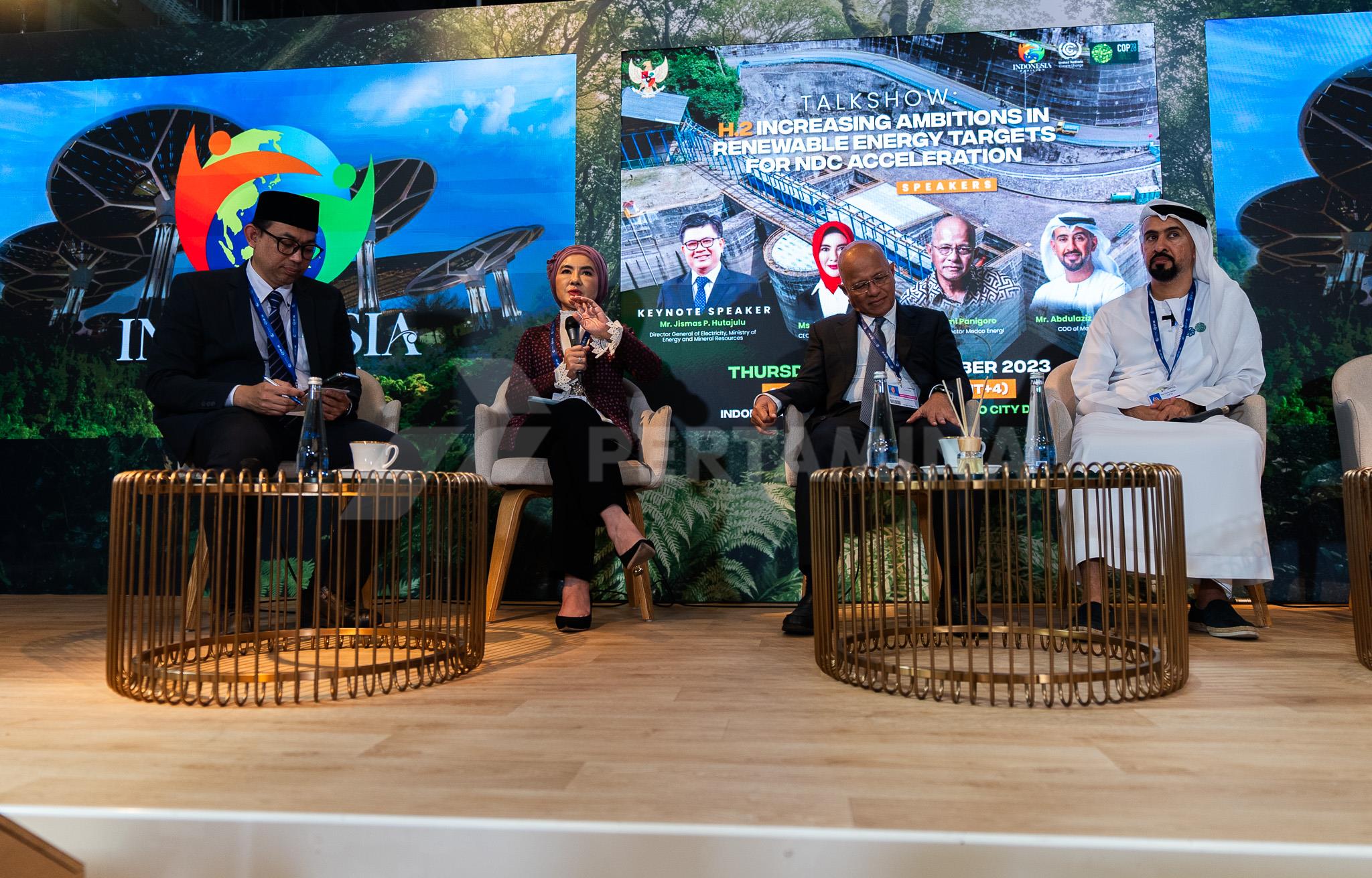
Attending COP-28, Pertamina Affirms Commitment to NZE 2060
Dubai, December 1, 2023 - At the 2023 United Nations Conference of the Parties (COP-28) held in the United Arab Emirates (UAE), the President Director of PT Pertamina (Persero), Nicke Widyawati, reiterated Pertamina's commitment to supporting the Indonesian government in achieving Net Zero Emissions by 2060.
During the discussion at the Indonesian Pavilion, Nicke Widyawati explained that Indonesia faces an energy trilemma of three main issues: energy security, equality, and sustainability. To address these, Pertamina has developed three comprehensive strategic initiatives, which include decarbonization in the company's operations (Scope 1), establishing new low-carbon businesses (Scope 2), and implementing carbon balancing programs (Scope 3).
As a developing nation, Nicke stated that Indonesia has a stable economic growth target in which energy serves as a catalyst. Therefore, as a State-Owned Enterprise (SOE), Pertamina places energy security as a top priority.
"However, we also need to manage the balance for energy equality, encompassing energy accessibility, affordability, and energy sustainability in reducing carbon emissions in our operations across scopes one, two, and three," said Nicke.
Nicke emphasized that Indonesia cannot solely focus on developing renewable energy and shifting all fossil fuels to renewables as it would jeopardize energy security. Hence, she mentioned Pertamina's three strategies for managing sustainability while maintaining energy security and strengthening energy equality.
Firstly, Pertamina must sustain its core business of oil and gas. The Indonesian government aims to increase upstream oil and gas production from 700 thousand barrels per day to 1 million per day by 2030. However, this must be done differently or through Green Operation.
Nicke mentioned Pertamina's three initiatives: energy efficiency, which significantly aids in emission reduction, contributing around 39% to the effort. "That's why we focus on energy efficiency in our operations: upstream, processing, and downstream."
Next is methane reduction. Currently, the focus remains on reducing CO2 emissions, yet methane has a higher capacity to harm the environment, worse than CO2 emissions. Hence, the target is a 7.6% reduction in methane, a 5.5% reduction in carbon emissions (CO2), and a 16.7% reduction in flare utilization.
"Through these three initiatives, Pertamina has successfully reduced emissions in our internal operations by 31% until last year," she added.
The second strategy involves enhancing low-carbon product development by producing biofuels. Why biofuels? Because Indonesia ranks eighth globally in terms of forested land. Therefore, Indonesia can produce biofuels.
"Now, with B35, last year, we successfully reduced around 32 million tons of CO2 per year. And we will add more B35 now and next year, reaching B40. Even in our new national energy policy, the target goes up to B60," Nicke added.
Additionally, Pertamina has a Biogasoline program by blending bioethanol from sugarcane, corn, and cassava into gasoline. Pertamina will start with E5% and, in Indonesia's National Energy Policy, gradually increase it to E40. About this vegetable-based fuel, Pertamina recently launched sustainable jet fuel mixed with CPO (Crude Palm Oil).
"So, this program is Indonesia's best option. It has three main benefits. First, we can reduce fuel imports through biofuels. Second, we can cut emissions. And third, it creates jobs upstream," she explained.
Furthermore, the third initiative involves carbon balancing. Even with remaining fossil fuels, such as coal-fired power plants, Pertamina aims to reduce emissions through Carbon Capture, Utilization, and Storage (CCUS) and NBS (Natural Base Solution)-based solutions utilizing its owned forests. Currently, it can absorb emissions globally by up to 15%.
In executing these initiatives, Nicke continued, Pertamina faces four challenges. The first is the regulatory framework to expedite renewable energy development. The second challenge pertains to technology. Indonesia requires technology for its abundant natural resources that can be converted into energy. The subsequent challenge is financial. Indonesia needs funding, especially for the initial development, research, and deployment stages. The last challenge is capacity and capability building.
"There are four challenges, and we believe that global collaboration is needed on how we can address these challenges, especially with the government's support," Nicke concluded.
In alignment with this, the Director-General of Electricity at the Ministry of Energy and Mineral Resources, Jisman P. Hutajulu, urged all stakeholders to drive energy transition by leveraging Renewable Energy (NRE).
"The development of NRE in this energy transition is for the long term," Jisman said during a discussion themed "Increasing Ambitions in Renewable Energy Targets for NDC Acceleration" on Thursday (30/11).
Pertamina, as a leading company in the energy transition, is committed to supporting the Net Zero Emission 2060 target by continuously promoting programs that directly impact the Sustainable Development Goals (SDGs) achievement. All these efforts align with Environmental, Social & Governance (ESG) implementation across all Pertamina's business lines and operations.**